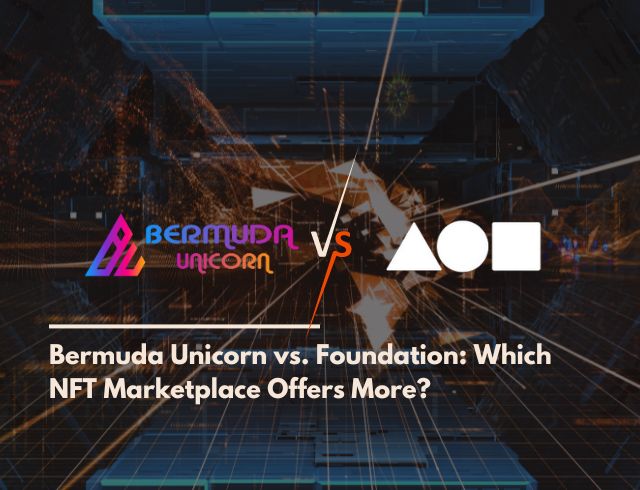

The NFT market has expanded significantly, and many platforms are competing for people’s attention regarding digital art and collectibles. Among them, there are two largest NFT marketplaces, Bermuda Unicorn and Foundation. While both of these platforms provide specific services and are most probably aimed at different populations. It is worth finding out which of them offers more. This will be achieved by evaluating the two marketplaces in various sectors. As we determine in this article which marketplace is the most appropriate for you.
Platform Overview
Bermuda Unicorn is an exciting project that serves as both a place to buy and sell NFTs and a virtual world at. It provides a service that one cannot find with other social media platforms. Such as 3D Microblogging whereby the user is in a virtual world socializing with other people. The utility and structure of Bermuda Unicorn go beyond being an NFT marketplace. As it is a one-stop shop for digital solutions tailor-fit for artists and buyers.
In contrast, Foundation is an NFT marketplace that is mainly centered on quality art digital artworks. However, it is unique as an NFT marketplace for artists to mint. And sell their art pieces to a sophisticated art clientele. The foundation’s focus is to encourage a group of people to develop projects that will expand the limits of digital culture.
User Experience
The reality integration with virtual space makes it fun to interact with as evident in Bermuda Unicorn. Users can view NFTs in 3D and can engage in various events like Interactive performances. And also has the provision of 3D Microblogging. This brings social interaction and community participation that is not very usual in normal NFT platforms.
The Foundation program is better known for its functionality. Although it also has a unique user interface, it is at the same time much simpler compared to other similar programs out there. The emphasis is on the artwork; the design of the application opens the opportunity to view, bid, or directly purchase an NFT. Unlike Bermuda Unicorn which contains more of a gamified experience. The foundation does an excellent job of ensuring that users seek to collect. And discover digital artwork and have a smooth journey through the platform.
Artist Support and Community Engagement
Bermuda Unicorn is expected to help many types of creators with features beyond the NFT marketplace it will employ. 3D Microblogging on the platform gives artists the freedom to share their working process. Communicate with the audience, and create a following. This seems to improve the relationship between the artists and the collectors. Thus improving the whole marketplace experience.
However, the Foundation also supports its artists yet in a more conservative manner. But it allows artists to promote their art which can be viewed by people from all over the world. And the fact that it is invite-only makes it possible to provide quality art that is in an art hosting platform. The foundation’s community is composed of enthusiasts in digital art, this will provide a conducive place for artists to create.
Market Reach and Diversity
Bermuda Unicorn handles both the virtual space and a varied offer of tools and this is why people, interested in NFT, digital art, games, and virtual worlds, can become its users. This also explains why this marketplace supports every kind of NFT such as art, collectibles, virtual world assets, and so on making it open for any artist or collector.
Foundation is far more selective in its target audience which is digital artists and collectors interested in purchasing and selling high-quality art that has been selected through a rigorous process to be posted on the platform but it lacks some of the elements that would appeal to a wider customer base in terms of how they will engage with the NFTs.
Conclusion: Which Offers More?
The decision to go for Bermuda Unicorn or Foundation will depend on your specific needs in a marketplace for NFTs. When searching for a service that is NOT merely a marketplace for trading NFTs, Bermuda Unicorn has a lot to offer, along with its virtual space, 3D Microblogging, and mature community. It is not just limited to NFT marketplaces; it’s a complete digital ecosystem.
That said if you want to focus on digital art alone and curated experience, perhaps, Foundation is the way to go. Modern, refined, and more art-centric than most, its simplicity and focus on artists and buyers make it ideal for the modern artist or collector.
In the end, and a nutshell, both platforms provide different experiences, and the users’ preferences and objectives within the NFT sector determine which one they will opt for.